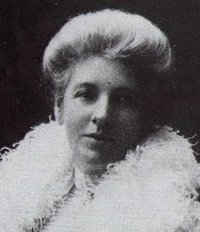![]()
Coasts
Rivers/Lakes
Lowlands/Plains
Geysers/Mud
Glaciers
Mt. Ruapehu
Mt. Cook
White Island
A Maori Legend
![]()
Abbotsford
Aramoana
Ballantynes
Brynderwyns
Cave Creek
Hawkes Bay
H.M.S. Orpheus
Influenza
Mt. Erebus
Mt. Tarawera
Rainbow Warrior
Seacliff Hospital
Tangiwai
Wahine
![]()
Annie Aves
Ata-hoe
Daisy Basham
Jean Batten
Minnie Dean
Mabel Howard
Margaret Mahy
Kath Mansfield
Kate Sheppard
Kiri Te Kanawa
Catherine Tizard
Murray Ball
Charles Goldie
Edmund Hillary
Richard Pearse
Lord Rutherford
Charles Upham
![]()
NZ FAQ--Funny
NZ Links
Credits
"That anyone devoting a quarter of an hour of calm consideration could possibly think that to deprive 120,000 persons of the right to vote is preferable to running the risk of a few postmasters opening sealed papers, passes my comprehension -- could a woman be so stupid?" --Kate Sheppard.
At that stage in time women tended to busy themselves with musical activities, entertaining, bridge parties or charitable works. But this wasn't for Kate. She quickly became involved with the Women's Christian Temperance Union and led a petition to ban the employing of women as barmaids. Meanwhile, sister Isobel became interested in the need for more suitable clothing for women and improving hygiene. Kate and Isobel both took up cycling seeing this activity as one where women were on an equal footing with men. Another aim of the WCTU was to obtain voting rights for women. In her position as Franchise Superintendent Kate devoted herself to this cause and became a skilful organiser, public speaker, diplomat and writer. She then went on to supervise five huge petitions to Parliament in favour of women being given the vote and continually lobbied Members of Parliament to gain their support. Kate's work was ridiculed and heavily criticised but she was determined and undaunted by the reactions of those around her. Men felt threatened and some some even considered that the natural order of society was threatened. There were numerous objections: A woman's place was considered to be in the home looking after the children while men were the income earners. If women had equal rights they might abandon their families. Women would be insulted at the polls! Voting was not feminine. Finances of the Colony would be adversely affected and New Zealand's credit in London would be shattered. The liquor lobby felt that women would vote to end the sale of alcoholic beverages, they wanted to protect their interests. Not only this, but women were considered emotional creatures and politics was no the place for excessive emotion. My favourite objection was the comment from Maori member, Mr Wi Pere, who was greatly concerned about the distraction women would be in Parliament. "Although I am getting up in years I must confess I should be affected by a weakness of that sort. If the honourable gentlemen in charge of this Bill would introduce a clause providing that only plain women should be allowed to come into the House, I think the source of danger would be removed, but if any beautiful ladies were sent to this House I am sure they would lead astray the tender hearts of some honourable gentlemen, particularly the elder members of the House. I say in conclusion that if attractive ladies are allowed to come into this House I am quite certain my own wife will never consent to my returning here." (He need not have been concerned, for the first woman to enter the House was still over fifty years away!) The five
petitions were rejected one after another, but each carried more
signatures than the one before until the final one carried the names
of 31,872 women. This was about a third of the female population
of New Zealand and helped silence those critics who stated that
women didn't really want the vote. The sections of this final petition
were carefully pasted onto a roll of wallpaper.
In 1892 a bill was moved to allow women postal votes. The idea was to make it easy for people in rural districts to vote, it would also prevent women suffering the embarrassment of voting at polling booths. This Bill was rejected, it was felt votes might be tampered with and that all voters should cast their votes in the same manner. But the voices of those signing the fifth petition were too loud to ignore and on September 19th, 1893, Kate's efforts were finally rewarded when New Zealand became the first country in the world to pass legislation allowing women to vote in the general elections. The following telegram from prime Minister, Richard John Seddon, (who determinedly opposed the Bill), confirmed the news: The Electoral Bill assented to by his Excellency the Governor-General at quarter to twelve this day. Trust that all doubts as to the sincerity of the Government in this very important matter have been effectively removed." Even this achievement didn't satisfy Kate Sheppard and she continued to work for women's rights for many years. Another of her hopes was that women would one day be granted permission to stand for Parliament, this was granted in 1919 and may have been influenced by the role women played during the war. In 1934, just before her death, Kate Sheppard had the satisfaction of seeing the first women MP enter Parliament. Kate Sheppard died on July 16th, 1934. She was 86. |


 Katherine Wilson immigrated to New Zealand in 1869 when
she was 20 years old. Two years later she married Walter Sheppard
and gave birth to a son, Douglass.
Katherine Wilson immigrated to New Zealand in 1869 when
she was 20 years old. Two years later she married Walter Sheppard
and gave birth to a son, Douglass. 